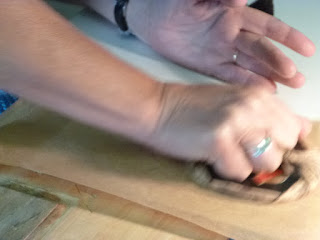In the notes that Carol provided was a diagram of the layout showing how woodblocks are traditionally printed . If only my efforts were quite so tidy and organised , I got carried away with the excitement !
The morning was devoted to preparation:
- clearing the gutters around the print areas and smoothing edges using the 'hira-toh' with it's bevel edge at 45 degree angle.
- making registration grooves ( 'Kagi' and ' Hititske' )with ' Kentoh ' chisel if hadn't already done so
- soaking the block , wrapping it in a damp tea-towel and plastic
- making a 'damp pack' with newsprint book ( 3 sheets folded in half then half again and cut along the top) using a 'mizu bake' ( goats hair waterbrush) , dampening every 3rd sheet. This was then wrapped in plastic sheeting with the wrapped block on top to flatten it.
- cutting paper to size ( 14.5 x 19 cm) . This took some time and some sums to work out how to get the most out of the sheet of Awagami Hosho. These were then placed in the damp pack over lunch .
We were told several times that accuracy and the right kind of dampness ( not too wet) are key to the process!
After lunch we prepared our 'Nori ' starch, squeezing out an inch into a plastic cup then gradually adding drops of water while mixing with a chopstick to get rid of lumps until the consistency was right(just dropping off the end of the stick) .
Then Carol demonstrated the process.
The watercolour/gouache was mixed with water in a palette( roughly same amount of water to paint, a thicker consistency than I would use for painting) and the damp block removed from the towel/plastic and placed on non-slip mat.
The nori was dotted on the block with a chopstick and then brushed in well with a 'maru -bake' or'burashi' ( very dense hairs)
Starting with the lightest colours, paint was dotted on and then rubbed in with a smaller 'hanga -bake' (bunched bristles tied together and held between 2 halves of a wooden handle). This was repeated 3 time in total.
The paper was removed from the damp pack using a scissor action and slotted first in the kagi corner registration, held in position with the thumb then laying paper along the hikitsuke registration. Then with a sheet of baking parchment over the top of the paper to prevent damage,holding the baren in a 'live long and prosper' Star Trek grip ( Margaret has a better photo in her blog post ) , rub down with the baren using a circular motion, matching the grain of the baren with the grain of the wood, softly at first then with increasing pressure.
Once printed with the first colour, the paper goes back into the damp pack.
Then it was our turn to set up the working space and start to print!
It took 4 different blocks and colours to build up this print, starting with the yellow ochre sand, then the cerulean sea, burnt sienna groynes and finally crimson Alizarin beach huts
Too much going on in such a small print and I wasn't happy with the registration and the accidental background marks where I hadn't cleared enough .
So I explored whether I could get the 'bokashi' (gradation printing) effect with my sea and sand blocks. It's subtle but it is there along with some embossing where I applied pressure with the baren. Magic!
Finally we had a demonstration ( with one of my completed prints) on how to stretch prints by drying then putting back briefly in the damp pack before taping with sellotape onto an acrylic sheet, going round the edge of the tape with the flat end of a brush before allowing to dry.















2 comments:
Wow! I love this! I always wondered how they did it! Make sure you link this on Off the Wall Friday. My husband is a woodworker and maybe he can help me try some woodblocks!
Thanks for the detailed instructions, Mags. I'll know where to find them!
Yesterday I stopped by Intaglio again to get a few missing items - that "shoebrush" was one - you see it being used in various youtube videos, and it'll be interesting to see whether it makes a difference to use it. They seem to put both the nori and the colour onto the brush at the same time ... but they are production printers and don't want to be wasting time!
Post a Comment